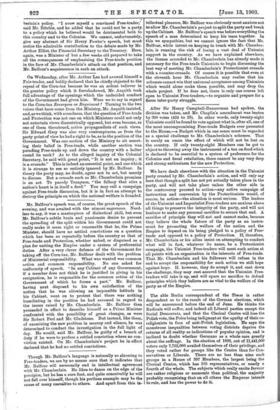Mr. Balfour's speech was, of course, the great speech of
the evening, and was awaited with the utmost eagerness. Need- less to say, it was a masterpiece of dialectical skill, but even Mr. Balfour's subtle brain and passionate desire to prevent the spreading of the split within his Government could not really make it seem right or reasonable that he, the Prime Minister, should have no settled convictions on a question which has been so repeatedly before the country as that of Free-trade and Protection, whether naked, or disguised as a plan for uniting the Empire under a system of preferential duties. After a very clever defence of the Government for taking off the Corn-tax, Mr. Balfour dealt with the problem of Ministerial responsibility. What was wanted was common action and common responsibility. No one asked for uniformity of speech. " In any Cabinet of any Government, if a member does not think he is justified in giving in his resignation, he is responsible for the common action of the Government of which he forms a part." Mr. Balfour, having next disposed to his own satisfaction of the notion that he was allowing an impossible latitude in his Cabinet, went on to protest that there was nothing humiliating in the position he had assumed in regard to the issues raised by Mr. Chamberlain. Mr. Balfour then proceeded in effect to describe himself as a Prime Minister confronted with the possibility of great changes, as were Sir Robert Peel and Mr. Gladstone. But instead, like them, of examining the new problem in secrecy and silence, he was determined to conduct the investigation in the full light of day. He would, said Mr. Balfour, be guilty of a breach of duty if he were to profess a settled conviction where no con- viction existed. On Mr. Chamberlain's project he in effect declared that he had no settled convictions.










































 Previous page
Previous page